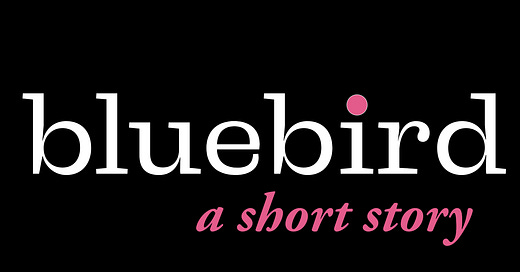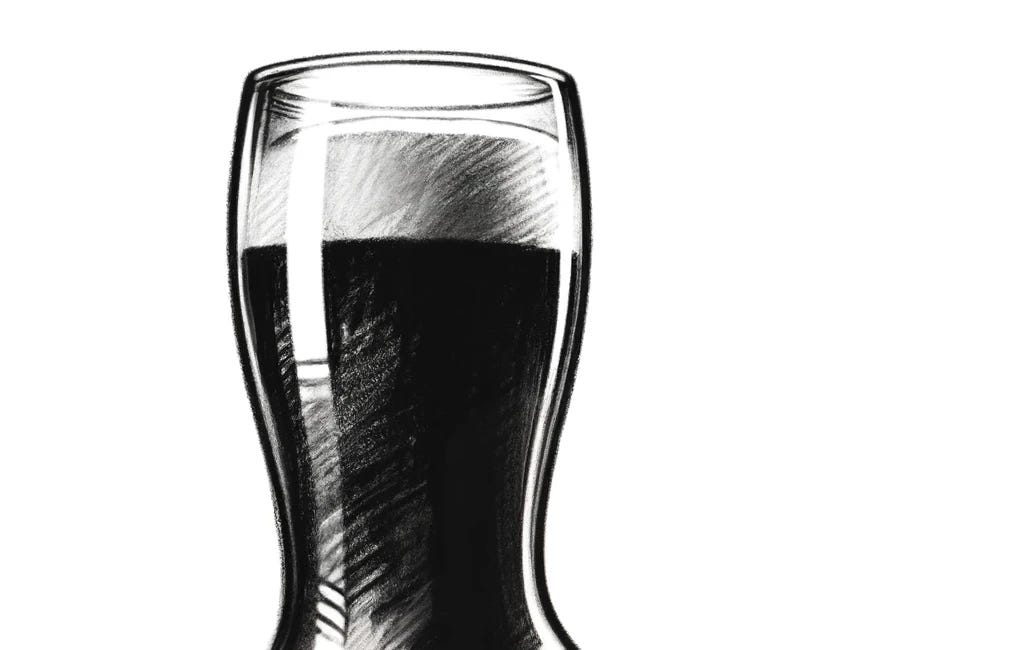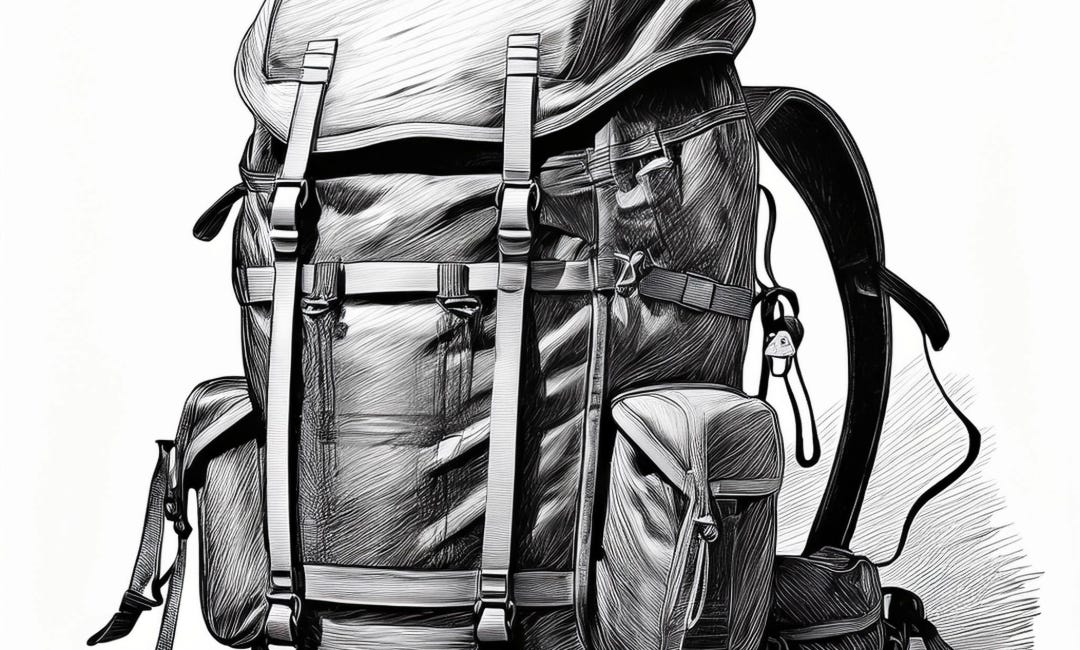Earle is one of the men of the big and open land, one of those pastoral folks who encroach upon civilization every once in an epoch or so, in the cycle of societal and systemic upheaval that coincides with and results from the hubris that their opposing agricultural urbanites eventually procure behind their walled kingdoms of plenty and comfort.
“I saw a thing once about those huge-ass pickup trucks,” says the kid beside him, who is certainly one of the urbanite sorts. “About how, like, they have no sightlines and are so dangerous.”
His name is something like “Aiden” or is otherwise aggressively modern, in a way that is the antithesis of the name “Earle,” which was old even when his mother passed it on to him from her father. Earle doesn’t bother to know their names anymore because jobs in the produce department of the grocery store are very much transitory for these kids, and they never make it so far as getting their name tags printed. They always somehow manage to do as little work as Earle, if not consciously, then simply because they lack the awareness to realize that there is ever anything to do without someone pointing it out to them.
The department is objectively a mess. Yams are unorganized, greens are uncut, they are out of fruit platters, and the banana table is in a state that—if the store were frequented by chimpanzees—would surely result in the angry throwing of feces, yet Earle and the kid still stand there, shooting the shit.
“They put, like, fifteen fake little kids in front of one, and the driver ran over and killed all of them before even seeing them. The visibility on those things is terrible,” the kid continues. “And it's like, 70% of people who own one don't even need a truck. They don’t use it for trucking.”
Why this kid has something against big pickup trucks is confusing to Earle in a way he is ashamed of, although he knows it has something to do with fossil fuels and sharing the road and doesn’t really have to do with visibility or sightlines. But he decides not to get defensive with the kid because he knows the kid is ignorant of his truck ownership and is just trying to make conversation.
Earle saw what the kid drives: a Nissan Altima, no doubt leased for him by his parents, if he’s anything like the other Aidens, Caidens, or Jaidens who pass through. He’d like to see a Nissan Altima make it back from the store to his trailer on County Road 57 in the winter, an unlined road the county hasn’t paved for twenty years that might as well qualify as off-roading and certainly denotes use for, as the kid said, “trucking.” One thing Earle’s never done is have to avoid fifteen children all at once.
“Gotta get under my truck and see what’s happening. Muffler's crazy loud,” Earle says, leaning his back against some cardboard boxes of Chiquita bananas. He twirls his knife in a way he hopes looks menacing and well-practiced. It’s technically the knife they issue to the produce employees for cutting fruit, but he makes a point to keep his sharp and to wield it even outside the confines of the fruit-chopping area, which is verboten, but following the rules isn’t really what Earle is good at.
The kid is clearly embarrassed to have bad-mouthed trucks and afraid he’s offended Earle, but he’s saved from awkwardness by an older customer who approaches them and asks what the difference is between scallions and green onions. The kid says, “Uh, one sec,” and runs to the back, where he will Google the answer on his phone.
Earle doesn’t have a smartphone. When one of the customers asks him about some exotic fruit or new product that has appeared on their shelves or what the difference is between two vegetable ingredients in their recipe, Earle responds:
“Sorry. This is rabbit food. I don’t eat the rabbit food. I eat the rabbit.”
This, of course, is not what Earle is supposed to say in these situations.
Earle isn’t really one for protocol, despite the fact he was once in the military, long ago. He was in the Gulf War, but didn’t really see any action—didn’t even fire a gun—though he acts like he did. Because he acts like he did, one time a grocery clerk mumbled something about stolen valor, so Earle went out to his truck and retrieved the tarnished Southwest Asia Service Medal he keeps in the glove compartment next to his Glock for situations like these, then wordlessly held it before him, which shut everyone up and made Earle even more insufferable to all.
What Earle lacks in following protocol and rules, he makes up for in following direct orders. This is what has kept him in this menial job for almost a decade now and is one of his only redeeming qualities. When it comes to written procedure or standard or expectation, Earle finds he is glad his military days are in the past. But when someone looks him in the eye, shakes his hand, or barks something at him directly, his military days come to the fore with a propensity to obey.
When they need someone to man the grill on employee appreciation day on the hot asphalt behind the loading dock, they tell Earle to do it, and he does so. When the local strawberry delivery isn’t in on time, they tell Earle to drive out to the farm and load the back of his truck up with crates and bring them to the store before they open, and he does so. When the freezer temp warning light goes on, they tell Earle to defrost the evaporator fan to get the freezer working again, and he does so.
The man dispensing these orders most regularly is the store manager, Mr. Salvatore. He gracefully ignores the apocalyptic state of his store’s produce department as he makes his way through it toward Earle with purpose, the command or directive he is about to give swirling around him like a horsefly.
“Earle the pearl,” he says from beneath his mustache as he shakes Earle’s hand. Mr. Salvatore has very soft, fleshy hands. He owns a truck like Earle does, a much newer, gleaming model but, as far as Earle can tell, Mr. Salvatore has no purpose in owning one, no use for “trucking.” He doesn’t even own a boat to pull. He talks a lot about taxes and money for someone with no boat. “Can you guess what I'm going to ask from you?”
Earle looks down at his knife and runs his finger along the sharp edge as carefully as he can without getting cut.
“Bird,” he says.
It’s the end of Earle’s shift, which means it’s mid-afternoon, just after lunchtime. Since the frigid and silent hour of 5 a.m. when he arrived, Earle has been aware of a bird trapped in the store.
Everyone has seen and wondered about the birds that make their way into a grocery store, how they get there and what becomes of them, often accompanied by an ache in their heart and a pang of poetic impulse toward the nature of freedom, what it means to fly, and the spirit.
The truth is that a bird in the grocery store, especially one that has taken up residence there and survived for some time—however desperately—within its prison by subsisting on the plentiful foodstuffs therein, constitutes a very large pain in the ass for grocery store managers.
Most health departments do not take kindly to such resident birds, enormous health risks as they and their feces constitute, and therefore solutions must be employed to be rid of them. One is for exterminators to come in and lay down some birdseed atop a sticky substance that traps and poisons the bird, but the health department doesn’t like that either. Another is to ingloriously try and shoo the bird with a broom toward the exit in a way that feels faintly emasculating.
Or, as in Mr. Salvatore’s case, you can just have Earle shoot it with his BB gun.
Earle comes back that night right before the store closes. The kids who work on the registers late at night are racing the store’s electric scooter carts through the aisles. Whenever they do this, it makes Earle think of his mom.
Earle’s mother is only seventeen years older than him, but she needs help like she’s an old woman already, even though she’s only (only?) sixty-seven because she ate TV dinners from the freezer case of a convenience store once a day for twenty years and smoked all the time and consequently has the type of diabetes that one acquires and is not born with, and an oxygen tank of a size befitting a scuba diver. Since none of the lottery tickets she bought in all those convenience store visits ever worked out, there’s no one Earle can make do her bidding for him, and so he does her bidding often, making him wonder if the source of his dog-like obedience is actually from a lifetime of servitude to the sort of woman who considers riding an electric scooter in the grocery store her God-given right and not a recent, modern convenience.
Tonight she’s bid him to bring home some TV dinners, which he will take without paying when he departs through the emergency exit in the back, where there are no cameras. Mr. Salvatore, of course, knows Earle does this, but figures it compensation for the ease with which Earle performs the bird assassinations.
Earle waits in the back room with his BB rifle for the store to close and for the electric scooter cart grand prix to end. Then he steps forth through the swinging doors like early man from the bush onto the savannah, from the woods to the clearing, from the cave to the tundra, to begin the stalking of his prey.
It’s less stalking, though, and more sitting and waiting on the hard floor of the store with his back to one of the produce bins and his BB gun propped beside him, a pile of bird seed calculatingly placed far away enough such that the bird wouldn’t fear his bearded face and might venture for a snack. Earle snacks on his own snack of sunflower seeds.
Earle waits and chews seeds. And waits. He napped at home, but his circadian rhythm isn’t used to being engaged at this hour, and he falls asleep sitting upright like he did in the army.
He dreams about accidentally running over fifteen Aiden, Caiden, or Jaidens with his truck. He dreams about attaching his mother’s oxygen tank to the back of her electric scooter and igniting it with one of her cigarettes, creating a sort of nitrous propulsion that sends her into the store wall with a fiery explosion. He dreams of towing Mr. Salvatore with his truck by the mustache and dragging him over a dock and into a lake.
When he awakens, the bird is there, pecking at the seeds.
It’s not like most birds they get in the store, which are some kind of common finch or sparrow of the brownish, unassuming type which no one really knows the name of. This bird is definitely something else, a bluebird, probably, if he had to guess by its smallness and its blue feathers and its orange-ish breast. Others might have paused at the serene beauty of such a creature, but not Earle, because he has not been told to marvel at beauty serene or otherwise, but to kill.
Like most people who shoot guns, Earle thinks he is a far better shot than he is, and nothing happens to dissuade that notion when he pulls the trigger and there is a burst of feathers and movement from the bird. But as he withdraws from the confines of the gun sights and looks back at the real world, the bluebird is not there.
Earle looks everywhere for the bird. He’s sure he hit it and that it flew away; he only needs to find it. He looks all night, a hunter for an already-killed quarry, desperate and tired, until eventually he is too tired and not desperate enough and treks back to his trailer in the truck, a stack of TV dinners under his arm as he leaves through the back door.
When Earle returns in the morning for his shift, he looks all over for the bird again, but still can’t find it.
The store opens. Before the end of his shift, there’s a scream of a sort horrendously out of place for a grocery store from near the table hosting avocados. Beneath the mound of rapidly ripening green, a horrified, Karen-esque customer has found the body of a deceased bluebird.
Mr. Salvatore, with palpable disappointment at the failure, of course, orders Earle to dispose of the little bird’s body. Earle takes it to the back to throw in the dumpster. But before doing so, he gives it a good looking-over.
It’s the strangest thing, but he never finds any sign of a BB in the dead bird.
thanks for reading this story about a guy who drives a truck. even if you didn’t like it, maybe click the little heart button so that people who might will find it. if you REALLY liked it, subscribe for more.
BOOK CLUB QUESTIONS:
Do you know anyone like Earle? How do you feel about them?
What does the bluebird symbolize to you?
thanks for reading PNP, where we try our best to shoo birds to the exit instead of shooting them with a BB gun. if you liked this story, you might also like these:






Sorry my homework is late:
My family is from a town where people would assume there are a lot of Earle’s (my grandpa is even named Earl) but I think a genuine Earle is harder to find than people might think. I think this kind of person represents something more extreme than the bitter aloofness some people in a rural area might feel. He’s more of a stock character or an archetype than a person. I think he’s meant to speak to a particular aspect of a disaffected and apathetic experience in life. There are people like Earle, I just think that what we’re seeing here is a specific part of them. I feel like they’ve made an effort to close themselves off from others and while they often claim it’s because of some insight or a lack of positive illusions these are deeply wounded people. I don’t like people like Earle and I struggle balancing the contempt and empathy I feel.
I think the bluebird represents something killed through callousness and indifference. I feel pretty differently about birds in stores than our narrator. It makes me happy to watch them intrude. We put up walls in a place they used to live and expect them to stay away. We don’t know how to react when they intrude on what we’ve built for ourselves. It feels like there’s a bit of rebellion to the act of a bird going somewhere it shouldn’t. Similar to a bird wandering into a building, Earle is stuck in a changed world that no longer makes sense to him. He feels vulnerable and left behind. While he affects a tough exterior he is hurting every day. Just like the modern landscape results in a bird dying without anyone’s direct action, Earle is slowly dying in a metaphorical way. He feels trapped in a society he paradoxically feels he’s been cast out of. His ability to connect with others is being destroyed by his apathy and his judgmental attitude. He copes by investing in cultural narratives around toughness and masculinity that are supposed to help him, but they don’t. Hating on the annoying young people won’t fix his health or his money problems. His anger has been co-opted by more powerful people to maintain control. I’d argue Earle is partly responsible but even if he could see his role in his suffering that doesn’t automatically grant him the skills to change.
I think that Earle like the bluebird is slowly being killed by the vastness and indifference of a society that doesn’t have him in mind. It’s why he lashes out in terrible ways and why the stress is always grating on him. I think he will probably die an early death related to stress.
TLDR I think you wrote a story about social murder which is one of the most political things there is.
Up there as one of your best, Clancy, in my humble opinion. Thoroughly enjoyed, not just because of what you told and where it went and the spot-on character of Earle, but because of the flow and prose and wit of it.
Like this:
"...because she ate TV dinners from the freezer case of a convenience store once a day for twenty years and smoked all the time and consequently has the type of diabetes that one acquires and is not born with, and an oxygen tank of a size befitting a scuba diver."
Sensational. Love it.
Now, the bluebird...
You know, my first thought when he first saw it was that he was going to have a change of heart, so I'm glad you subverted my expectation there and he still took the shot.